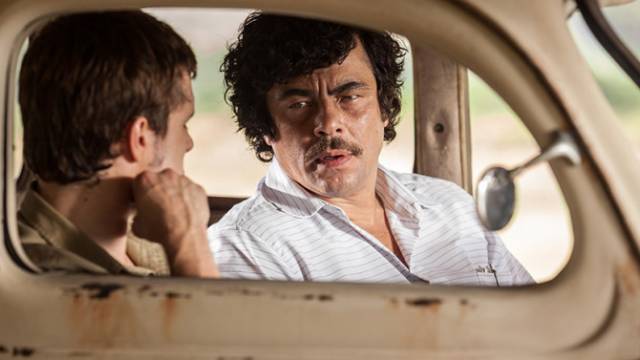
 The divided title of Escobar: Paradise Lost reveals the essential problem with writer/director Andrea Di Stefano’s film – that’s it’s aspiring to be two different films that don’t always cohere. One aspiration is to portray the larger than life story of Pablo Escobar (Benicio del Toro), with all the cinematic allure and gravitas that go with a powerhouse actor playing a criminal kingpin, a story completely rooted in Colombia of the 80s and 90s. The other story the film aspires to tell is more archetypal; an naive young man, in this case a Candian surfer named Nick (Josh Hutcherson), goes south to seek a more innocent lifestyle closer to nature, only to have his idyll shattered by unfathomable violence. Each of these stories has their own attractions and Escobar: Paradise Lost is often exciting and entertaining, but feels disjointed when looked at as a whole.
The divided title of Escobar: Paradise Lost reveals the essential problem with writer/director Andrea Di Stefano’s film – that’s it’s aspiring to be two different films that don’t always cohere. One aspiration is to portray the larger than life story of Pablo Escobar (Benicio del Toro), with all the cinematic allure and gravitas that go with a powerhouse actor playing a criminal kingpin, a story completely rooted in Colombia of the 80s and 90s. The other story the film aspires to tell is more archetypal; an naive young man, in this case a Candian surfer named Nick (Josh Hutcherson), goes south to seek a more innocent lifestyle closer to nature, only to have his idyll shattered by unfathomable violence. Each of these stories has their own attractions and Escobar: Paradise Lost is often exciting and entertaining, but feels disjointed when looked at as a whole.
Nick lives on the beach in a surfer colony led by his older brother, Dylan (Brady Corbet). While Dylan seems cognizant of the troubled realities of 1991 Colombia, to the younger and more oblivious Nick, it’s simply an idealized Eden where he can roll out of his hammock and surf all day. Nick becomes more interested in the locals when he falls for Maria (Claudia Traisac). Maria is dedicated to helping Colombia’s less fortunate by providing clinics and healthcare, but she does this with money from her uncle Pablo. Nick is drawn into the orbit of Escobar, an orbit that seems to encompass the whole country. Escobar plays the role of patriarch well, splashing in the pool with young children and doting on nieces like Maria, but all of his wealth springs from his iron grip on the cocaine trade, maintained by killing after killing. After a key political assassination makes his freedom untenable, Escobar negotiates his surrender and enlists Nick to help hide some of his massive wealth, sending Nick into the center of the violence he’s tried to escape.
For a while, it seems as if the film’s focus will be on the cultural and family aspects of Escobar’s life from Nick’s outsider perspective, almost like The Godfather told from Diane Keaton’s character's point of view, but then the second half of the film is essentially one long action scene over the course of 24 hours. The action is often thrilling, but it’s unsatisfying from a character perspective because Nick is essentially a blank slate with no real traits or opinions. The possibly complex moral questions the film could have asked are merely reduced to a pat condemnation of violence. Similarly, the character of Maria is a lost opportunity; as both a liberal idealist and Escobar’s niece, her character has inherent conflict, which is never explored as the film instead uses her as a prop to the male characters. Del Toro as Escobar is predictably fantastic and probably the best reason to see the film. He’s both charming and calculating, his personal power evidenced in every interaction and rendered all the more terrifying for his calm implacability, the mass murderer hiding in the role of a soccer-loving family man. But for all of del Toro’s ability, the film’s Escobar will never enter the cinematic crime lord hall of fame with Tony Montana and Don Corleone because Escobar experiences no real internal drama – he’s a static character who’s made all of his decisions long before he assumes a role in the story of far-less compelling Nick. Hutcherson is passable in the film’s first half where he can act naturally as a goofy gringo but becomes tiresome by the action filled second half where whenever he holds a gun he must resort to tear-filled facial contortions to convey “Serious Acting.”
Escobar: Paradise Lost is messy but entertaining. While the structural and character problems outlined above keep the film from being great, the action is thrilling while still put in a social context, the beauty and brutality of Colombia is brought to life better than in any previous American film, and overall Escobar: Paradise Lost is an impressive debut for Di Stefano.